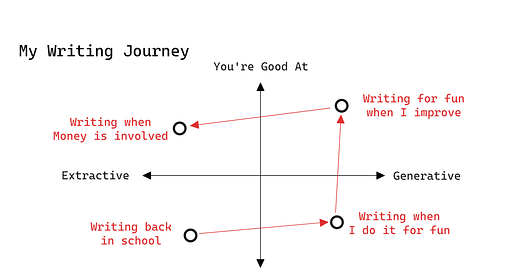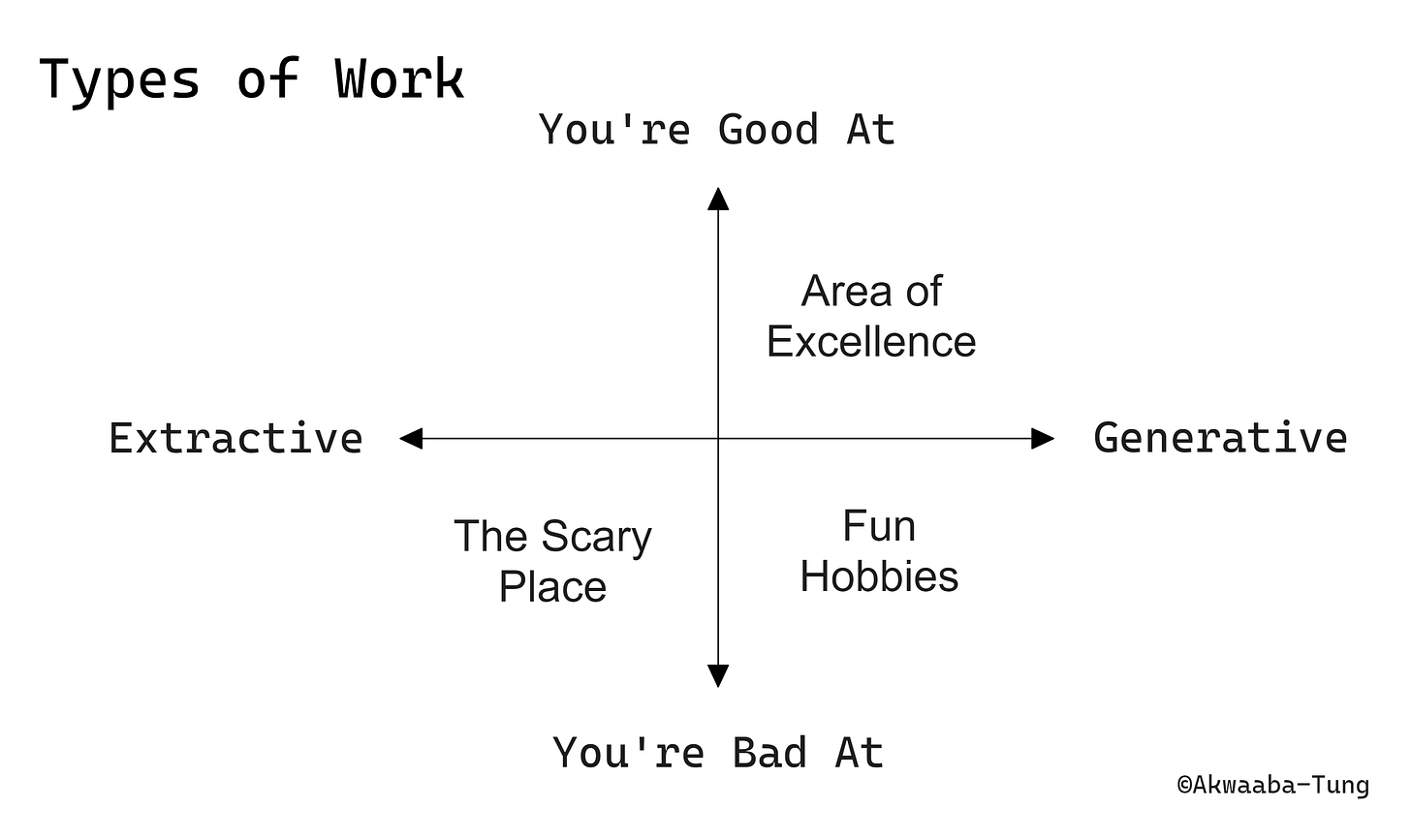Meaningful Work: Extractive vs Generative
Can we find work that we’re both passionate about and are good at?
In most career counseling conversations, I usually come across 2 camps of advice.
The first camp tells us to follow our passion, do what we love with an intense obsession that only we can possess, and we’ll be better than 95% of everyone else who’s trying to do it as a job.
Passion drives Mastery.
In the second camp, the advice is to do what you’re good at, screw passion because it’s just a feeling. Play to your unique advantage.
Stay committed to delivering the best work possible, not because you’re passionate about it, but because you’re a professional. People will recognize you for the quality of your work, not how much passion you put into it.
Commitment drives Mastery.
I think there’s validity in both arguments. But like most discussions with 2 opposing sides, I try to find the third side. Can we find work that we’re both passionate about and are good at?
As I reflected on why and how I ended up doing the work I’m doing (a creator-led business owner), I realized that the word “passion” is not enough to explain my complicated relationship with work.
So I decided to “invent” the “Extractive - Generative Work” spectrum (a concept I developed after watching Jensen Huang, Nvidia’s founder interview at Stanford Graduate School of Business about the difference between extractive algorithm and generative AI).
Simply put:
"Extractive Work” is work that drains your energy.
“Generative Work” is work that gives you energy.
Now, let’s put everything on the “Types Of Work Matrix”:
On the X-axis, you’ll have Extractive Work on the left and Generative Work on the right.
On the Y-axis, you’ll have Work You’re Good At on top and Work You’re Bad At at the bottom.
Ideally, all of us want to do generative work that we’re good at - this is our AREA OF EXCELLENCE.
We get energy from doing the work, and we’re good at it, meaning we’re excited to return to it and get better every day. As a result, we’ll get INFINITELY better and happier if we function here.
Next stop: THE SCARY PLACE where we’re desperate to get out.
No one wants to do work we’re bad at that also drains our energy. The few reasons people accept to stay in this quadrant are immense financial pressures, fear of “no better work”, or social pressure (family expectations).
The generative work you’re bad at is an interesting area.
Imagine your friend who LOVES playing football but is insufferably bad at it. The guy who shows up early every game, fully-geared, does all the proper warm-up, and then goes on to play for 5 minutes as a “liability”.
He’s for sure passionate about this sport, but God forbid he’s just not gifted to play it.
But it’s fine, the activity is generative and he’s not depending on it financially.
Most people keep activities in this area a HOBBY.
Lastly, I think the scariest quadrant to be in is the Extractive Work you’re good at. This is work usually referred to as “CORPORATE JOBS” by many people of my generation.
A “Corporate Job” usually means something you don’t enjoy doing, but because you’re good at it, you’re well compensated for it. So you work to pay the bills.
It is dangerous here IF this is the ONLY quadrant that you hang out in. Doing only Extractive Work is how people get burnt out.
That’s why most of my “corporate friends” try to engage in some kind of low-stake hobbies OR generative/creative work in their free time.
If your main job is Extractive, I think it’s crucial to recharge yourself with Generative Work.
Most importantly, it’s dangerous here because companies and society can guilt you against quitting to find what you’re truly passionate about (your generative work).
Why would you quit such a good job that you’re excellent at?
“Because it drains my energy and makes me miserable” isn’t usually a sociably celebrated answer. So why would you really?
A case study
Now that you’ve got an understanding of this matrix, I would like to explain my writing and entrepreneurship journey using this mental model.
Once upon a time, I was a terrible writer back in school.
Even though I could understand the literal meaning of the literature works being studied, I would never be able to analyze them by the grading rubrics. My ideas were scattered. My sentences made no sense. My vocabulary was limited.
Writing back in school was extractive work that I was VERY BAD at.
Then I started writing this blog more than 4 years ago.
My original purpose was to document my learning journey and tell the stories of the great people I met along the way. So when I started, I wasn’t a very good writer either.
There were a lot of “transferable traits” I carried over to blog writing from high school writing. Long, unclear paragraphs, run-on sentences, inappropriate word choices, to name a few 🙂
But even though I wasn’t very good at blog writing, I had a lot of fun doing it. The joy of putting my thoughts and emotions down on “paper”, and sharing them with the world gives me so much energy.
In the beginning, Blogging was generative work I wasn’t good at :)
Then I did it for long enough, with a feedback system rigorous enough, that I got better and better over time.
Writing became easier. Ideas came much more naturally. My writing became clearer and more concise.
My system of idea collection started to work and pay bigger and bigger dividends every day. The system of habits around writing made me a healthier person, a clearer thinker, and a more thoughtful communicator.
People started asking me questions about writing, and inviting me to host writing workshops. These external validations really boosted my confidence in my writing ability.
Writing became GENERATIVE work that I was pretty good at.
Then, I decided to build a business around my ability to write and reach a lot of people - also known as a “creator-led business”.
Writing is fun, and I’m good at it. Might as well monetize from it. How hard can it be?
I was wrong.
I made that decision, not knowing that the moment you add money to the equation, generative/creative work becomes a responsibility.
Here, Writing is slowly becoming EXTRACTIVE work I was good at.
Depending on the scale of your business (whether you’re taking donations, setting up a paywall, occasionally taking on a few brand deals, or building a team to launch a serious business), the size of that responsibility will differ.
Here are some simple Maths to understand this situation:
More money = More Responsibility
More people = More Responsibility
More responsibility = More Stress
More Stress = Less Generative
When I feel like I have to write to drive sales, so I can meet the next payroll and keep the business alive, it’s a very different kind of writing. There were a few days when I just wanted to quit writing for good - a thought that had never come when I was just writing for fun.
However
It’s worth noting that the status of an activity on the matrix isn’t fixed.
There are writing sessions that give me sooo much energy and joy - Generative Work (like writing this piece).
But there are also sessions where I feel super drained creatively and really question my decision to pursue this career - Extractive Work.
I believe that once you become good at something and start monetizing from it,
you WILL move back and forth on the Extractive - Generative spectrum.
Responsibility comes hand-in-hand with stress.
But a little bit of stress shouldn’t stop you from a life well-lived.
For me, a life well-lived isn’t a life in which you only do the work that brings you joy.
A life well-lived gives you both a purpose to die for - your WHY,
and a sustainable process to get there - your HOW.
This sustainable approach is usually a balance of Generative and Extractive Work.
Sometimes, you have to do the things you hate, to advance a cause that you care about.
To conclude
“Life is not a problem to be solved but a paradox to be experienced.” - Derek Sivers
The paradox of generative and extractive work is one I hope you can experience, reflect, make changes, and experience some more.
Enjoy life, with all the ups and downs that come with it 🤟
And remember that:
“Work that energizes you” doesn’t have to energize you ALL THE TIME.














Congrats for the great piece of writing! Do you think the activities becomes extractive when we are not good at it, not because of the activity itself? For instance, when I started snowboarding, I hated it because I fell too much so it drains my energy physically and mentally. But as I get better, it becomes more generative. I hope to learn from your opinions!
Tùng ơi I love and need this so much.